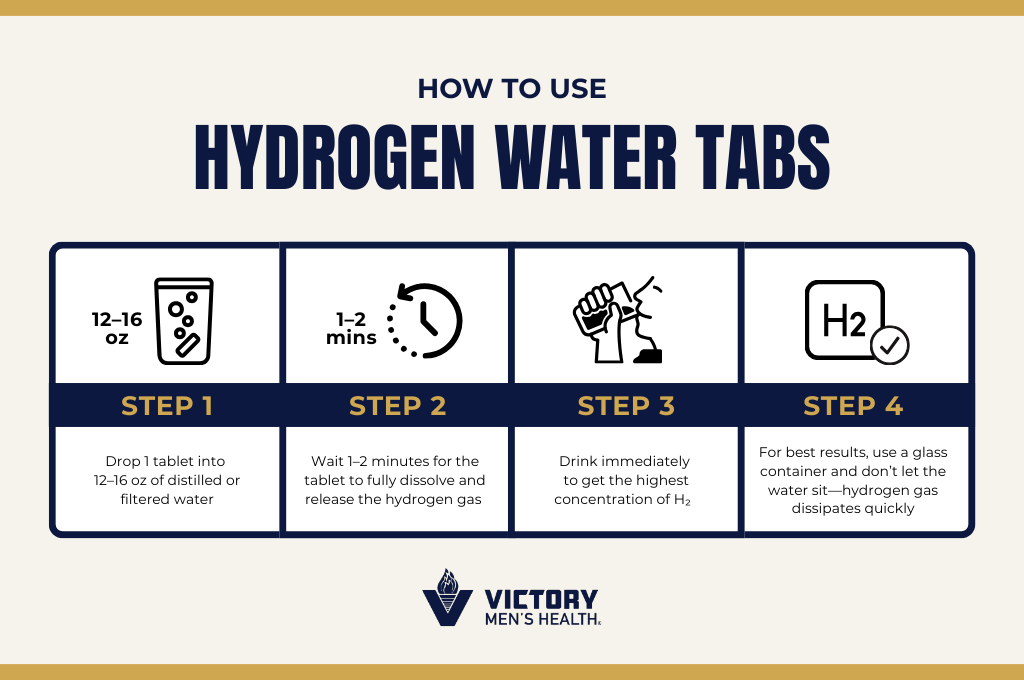Recently featured on the Joe Rogan Experience podcast, hydrogen water gained major attention when Gary Brecka called it “the greatest biohack on Earth.” Brecka doesn’t throw around terms like that lightly, so it’s no surprise that the biohacking community is buzzing.
After hearing what hydrogen water can do, it’s hard not to be intrigued. According to Brecka, sipping it daily can potentially impact everything from pain and inflammation to circulation, cognition, and even how fast you age.
Whether you’re deep into your biohacking journey or are simply looking for ways to feel healthier and live better, we’re breaking down everything you need to know about hydrogen water. In this blog post, we’ll cover what it is, how it works, and whether it’s worth trying out.
What is Hydrogen Water?
If this is your first time hearing about hydrogen water, you’re not alone—and no, it’s not just fancy H2O. Hydrogen water is regular water infused with molecular hydrogen gas (H₂). That’s it, but there’s more to it than that.
Hydrogen is the smallest and most abundant element in the universe, and it plays a crucial role in your body’s chemistry. When you dissolve hydrogen gas into water and drink it, it acts as a selective antioxidant. This means it only targets the harmful free radicals in your body (like hydroxyl radicals) without messing with the good ones you actually need (like nitric oxide).
This helps your body reduce inflammation, support circulation, and regulate oxidative stress in a more natural, balanced way.
What Are the Hydrogen Water Health Benefits?
Don’t just rely on the Joe Rogan/Gary Brecka hype alone—there’s science behind hydrogen water. One standout clinical study, published in the Journal of Experimental Gerontology, followed older adults drinking hydrogen water for six months.
The results? The group that drank hydrogen water saw a 4% increase in telomere length, which is considered a marker of biological aging. On the flip side, the control group lost 11% of their telomere length. In addition to cellular longevity, the study also reported:
- Improved short-term memory and cognitive function
- Better sleep quality
- Improved circulation
- Lower inflammatory markers like CRP (C-reactive protein)
Gary Brecka and others have also reported faster recovery from workouts, reduced arthritis pain, and even better skin health. Whether you’re optimizing for longevity or trying to get out of pain, it’s clear that this biohack might be worth your time.
Hydrogen Water vs. Alkaline Water: What’s the Difference?
If you’ve ever walked through a health food store or scrolled on TikTok, you’ve probably seen both hydrogen water and alkaline water being hyped as the next big thing. While they might sound similar, they’re actually very different—and hydrogen water may be the superior pick.
Alkaline water is water with a higher pH, often created by adding minerals like calcium or magnesium. The idea is that it can neutralize acid in the body and promote better health. The only problem? Research has shown that many of the benefits people attribute to alkaline water only happen when hydrogen gas is present. Without it, the results disappear.
Hydrogen water, on the other hand, contains dissolved molecular hydrogen gas (H₂), which acts as a selective antioxidant and anti-inflammatory agent. That means it goes after the bad free radicals and leaves the good ones alone. It supports your body’s natural balance, rather than just changing your pH.
TL;DR — The real power behind alkaline water might be the hydrogen gas, not the pH. If you’re looking for science-backed benefits, hydrogen water is the better bet.
What Are the Side Effects of Hydrogen Water?
Hydrogen water is generally considered very safe. In fact, there are no known toxic effects from drinking hydrogen gas dissolved in water. That said, some people experience mild detox-like symptoms when they first start as inflammation begins to shift in the body.
The mild hydrogen water side effects can include:
- Fatigue
- Headaches
- Changes in digestion
However, they usually go away quickly and are a sign that your body is responding to the change. Just be sure you’re using a reliable source to avoid issues like chlorine gas formation from tap water.
What’s the Best Way to Get Hydrogen Water?
There are a few ways to add hydrogen to your water (even your bathwater), but not all of them are created equal. Here’s a breakdown of the options, plus what Gary Brecka recommends for consistency, effectiveness, and affordability.

Hydrogen Water Tablets (aka H2 Pills)
These are Brecka’s top pick, and they’re probably the easiest and most cost-effective option on the market. Just drop a tablet into water, let it dissolve, and drink. You get a high concentration of hydrogen gas, it’s consistent, and it costs about a dollar a day. Hydrogen tablets, or H2 pills, are great for everyday use.
Hydrogen Water Bottles
These used to be all the rage, but they come with a major drawback. Many use a proton exchange membrane at the bottom, which degrades over time. That means you may start out with a strong hydrogen dose but end up with almost none after a few months.
Brecka used to promote these but now recommends skipping them unless you’re swapping the membrane regularly (which can be expensive).
Hydrogen Bath Bombs
These work by releasing hydrogen gas directly into a warm bath. Because hydrogen is so small, it can be absorbed through your skin (transdermally). Brecka recommends these for people dealing with arthritis, joint pain, or post-injury inflammation, and the results are impressive. It’s not uncommon for someone with severe stiffness to walk out of the tub feeling pain-free.
Hydrogen Generators (Home Units)
These are high-end machines that create and circulate hydrogen gas into water for cold plunges or baths. They’re great if you’re committed to the biohacking lifestyle and want to combine hydrogen therapy with cold exposure, which holds more gas. But be warned—hydrogen generators can run $7,000 to $8,000+ for a quality unit.
Who Should Try Hydrogen Water?
Hydrogen water isn’t just for pro athletes and wellness junkies. This biohack could be a helpful tool for nearly anyone dealing with inflammation or fatigue, or looking for an edge in how they feel and function every day.
You might especially benefit from hydrogen water if:
- You have joint pain, stiffness, or arthritis
- You’re experiencing brain fog or memory decline
- You’re focused on anti-aging or longevity
- You’re dealing with poor circulation or high inflammatory markers
- You want better workout recovery and deeper sleep
- You’re just starting your health optimization journey and want an easy win
If you’re interested in how biohacking and targeted lifestyle changes can reverse inflammation and chronic illness, check out this episode of the Women Want Strong Men podcast. Victory Men’s Health CEO Amy Stuttle interviewed functional medicine expert Umahro Cadogan, who used biohacking to overcome serious health challenges.
Can You Make Hydrogen Water at Home?
Absolutely, and it doesn’t have to be complicated or expensive. The easiest way to make hydrogen water at home is with hydrogen tablets. All you need is a clean glass of water (ideally distilled or filtered), drop in a tablet, and wait a couple of minutes for it to dissolve.
You can also use a hydrogen water bottle or generator, but as Brecka explained on the Joe Rogan Experience podcast, those can wear down over time or cost significantly more upfront. If you’re just getting started, stick with tablets for a more affordable option you can trust.
So… Do You Recommend It?
At Victory Men’s Health, we only recommend solutions that actually move the needle—and hydrogen water is one of those tools we believe is worth considering. It’s not a miracle cure, but the research and real-world results are promising.
The potential benefits are especially meaningful in inflammation reduction, recovery, and cellular-level longevity support.
If you’re already working to optimize your health through nutrition, hormone balance, and supplementation, hydrogen water could be a simple, affordable way to kick things up a notch. When used consistently, the benefits can add up.
Not sure where to start? We can help you figure out whether hydrogen water fits into your unique health plan and guide you toward the best, most effective options. Schedule a consultation with our team to find out if this biohacking tool is right for you.
Your Top Questions, Answered
Can Hydrogen Water Help You Lose Weight?
It’s not a fat-burning miracle, but hydrogen water may indirectly help with weight loss. By lowering inflammation, improving energy levels, and supporting mitochondrial function, it can make it easier to work out, recover, and stay consistent with a healthy routine.
Is Hydrogen Water Safe?
Yes, it’s very safe. Hydrogen gas has been studied for years and has no known toxicity, even at high doses. Just make sure you’re using tablets or bottles from a reputable source to avoid poor-quality hydrogen production or chemical contamination.
Is Hydrogen Water Good for Blood Pressure?
Possibly! Early research suggests that it may support healthier blood pressure levels by improving circulation, enhancing endothelial function, and reducing oxidative stress in the blood vessels.
There are also some studies exploring its potential to improve cholesterol levels, which could further benefit cardiovascular health. While more research is needed, the initial findings are promising—especially when combined with other healthy habits.
Is Hydrogen Water Good For Kidneys?
Its anti-inflammatory and antioxidant effects may support kidney health, especially in people dealing with oxidative stress. If you have existing kidney conditions, check with your healthcare provider before adding new supplements or therapies.
Begin Your Biohacking Journey with Victory Men’s Health
From cognitive clarity to reduced inflammation and even anti-aging at the cellular level, hydrogen water is a simple yet powerful tool to support long-term health. Whether you’re brand new to biohacking or looking to level up your current routine, it’s a great place to start.
At Victory Men’s Health, we take a personalized, science-backed approach to help you optimize your health and well-being. From advanced lab testing and hormone optimization to anti-aging protocols, supplements, and therapies, we can help you eliminate the guesswork.
Ready to see what your body’s truly capable of? Schedule a consultation with our team and let’s start building your biohacking roadmap today.




